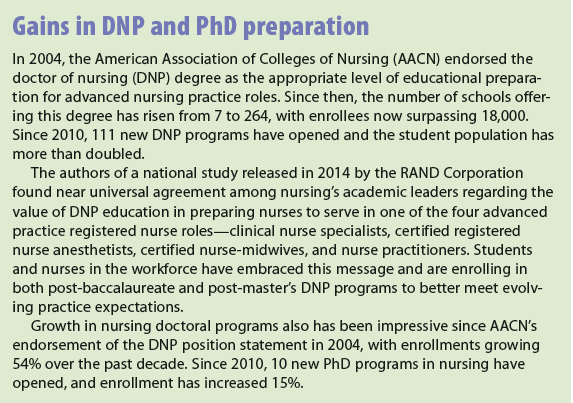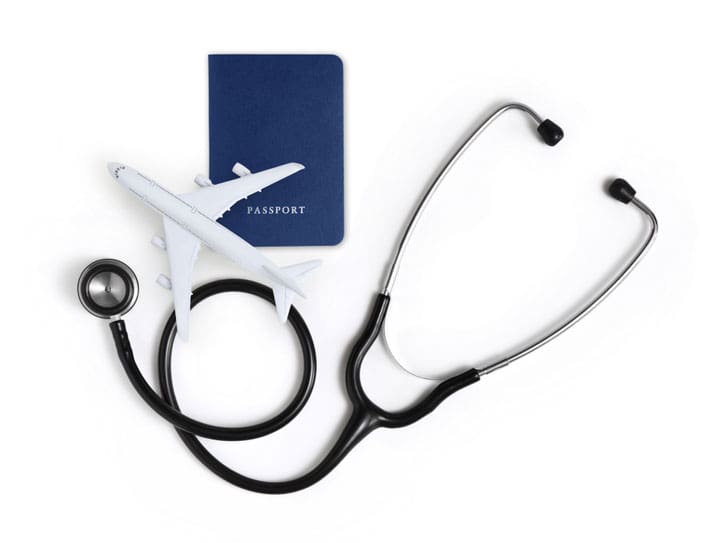Although support for academic progression was once considered divisive in some nursing circles, times have changed. The need to advance the educational level of the nursing workforce—a key recommendation in the Institute of Medicine (IOM)’s 2010 report The Future of Nursing: Leading Change, Advancing Health—is now widely embraced by most national nursing organizations and patient advocates seeking to move the profession forward.
Why is this important? As academic nursing leaders, we understand that education matters and directly affects a nurse’s ability to provide high-quality care. The evidence-based findings in the IOM report and related studies have sent a clear message to employers, practicing nurses, students, and other stakeholders: Preparing a more highly educated nursing workforce is in the best interest of the patients and communities we serve.
Across the nation, many hospitals and other practice settings are providing funding for nurses to continue their education and are offering more flexibility for nurses who must juggle work and school demands. Employers are recognizing education makes a difference and are moving to hire more baccalaureate-prepared nurses into entry-level registered nurse (RN) positions.
Data collected by the American Association of Colleges of Nursing (AACN) show that 79% of employers now require or express a strong preference for nurses with bachelor’s degrees.
Growth in BSN and graduate programs
Nursing schools have made achieving the IOM’s nursing education goals a top priority and are working to expand capacity in their undergraduate and graduate programs to meet growing demand. Since 2010, 63 new entry-level bachelor of science in nursing (BSN) programs have opened nationwide, in addition to 46 new BSN degree-completion programs for RNs seeking baccalaureate degrees. Growth in graduate nursing programs also has been impressive, with 28 new master’s programs, 10 new PhD programs, and 116 new doctor of nursing practice (DNP) programs opening in the last 5 years.
Our progress in achieving higher levels of education is beginning to show. For more than a decade, enrollment in BSN programs has increased steadily each year. After the IOM recommended an 80% increase in baccalaureate-prepared nurses in the workforce by 2020, the number of students entering those programs accelerated rapidly. Over the last 5 years, enrollment in RN-to-BSN programs increased 69%, and enrollment in entry-level BSN programs rose 17%. But despite these gains, only about 55% of RNs currently are prepared at the baccalaureate level or higher, according to the latest statistics from the National Council of State Boards of Nursing.
In master’s programs, students also are returning to school in ever-increasing numbers. Since 2010, enrollment in master of science in nursing (MSN) programs has increased by 31%, with more than 113,000 students now in the MSN pipeline. Much of this growth can be attributed to nurses interested in pursuing advanced roles, such as nurse administrator and clinical nurse leader.
Further along the educational continuum, nursing schools are making great progress in their efforts to double the number of nurses with doctorates, as the IOM recommended. Much
of this new growth has been achieved through widespread adoption of and interest in the DNP. (See Gains in DNP and PhD preparation.)
Expanding educational options
Fortunately for nurses considering a return to nursing school, options for completing a program have expanded. Many degree-completion programs, including those for RNs seeking to complete a master’s degree (RN-to-MSN), are offered completely online or in a hybrid format (a combination of classroom and online sessions). Typically, students have the option of completing programs on a full- or part-time basis, though many schools encourage applicants to enroll full-time when possible. Also, some schools are moving to offer evening and weekend classes to accommodate working nurses’ needs.
Sending the right message
For nurses to meet today’s employer expectations, climb higher on the career ladder, and assume leadership roles within health care and the profession, education is the key. Research highlighted in the IOM report indicates nurses with more education are better equipped to provide higher-quality patient care.
Achieving the IOM’s recommendations for education advancement will require innovative solutions and collective action by all parties engaged in developing future generations of nurses. Successfully reaching these goals requires strong academic-practice partnerships and a solid commitment among practice colleagues to encouraging and rewarding educational advancement of their nursing staff.
Now is the time for nurse educators, higher-education administrators, employers, legislators, and other stakeholders to commit to marshalling resources and providing opportunities to enable all nurses to move ahead with their education. Together we can send a message that education is an essential element of nursing practice, while instilling a passion for lifelong learning among new and experienced nursing professionals. Our patients deserve nothing less.
Deborah E. Trautman is chief executive officer of the American Association of Colleges of Nursing.
Selected references
American Association of Colleges of Nursing. 2014-2015 enrollment and graduations in baccalaureate and graduate programs in nursing. Washington, DC: Author; 2015. www.aacn.nche.edu/research-data/standard-data-reports
American Association of Colleges of Nursing. Employment of new nurse graduates and employer preferences for baccalaureate-prepared nurses. Washington, DC: Author; 2014. www.aacn.nche.edu/leading_initiatives_news/news/2014/employment14.
Auerbach DI, Martsolf G, Pearson ML, et al. The DNP by 2015: A Study of the Institutional, Political, and Professional Issues that Facilitate or Impede Establishing a Post-Baccalaureate Doctor of Nursing Practice Program. RAND Corporation; 2014. http://www.aacn.nche.edu/dnp/DNP-Study.pdf
Budden JS, Zhong EH, Moulton P, Cimiotti JP. Highlights of the National Workforce Survey of Registered Nurses. J Nurs Reg. 2013;4(2): S1-S72.
Institute of Medicine. The Future of Nursing: Leading Change, Advancing Health. October 5, 2010. http://www.nursingworld.org/MainMenuCategories/ThePracticeofProfessionalNursing/workforce/IOM-Future-of-Nursing-Report-1spx
Click to read the next article: Keeping nurses healthy, safe, and well




















1 Comment.
I am writing in response to the article “Moving the needle: What the data tell us about academic progression” from American Nurse Today, volume 10 number 9 by Dr. Trautman. The article stressed the importance of registered nurses obtaining a baccalaureate degree and linked advanced nursing education with better patient outcomes. I agree that increasing the number of baccalaureate and advanced practice nurses is imperative to providing the highest quality of care to patients and the surrounding community. While academic program availability was discussed in detail, organizational incentives to improve enrollment in BSN programs were not addressed in this article. My purpose is to add to the article from the perspective of an associate degree nurse, addressing motivating factors to advance education and provide a strategy to meet the goal of increasing the nursing workforce to 80% baccalaureate nurses by 2020.
“Motivating Registered Nurses to Return for an Advanced Degree”, published in the volume 40 issue 5 May 2009 issue of the Journal of Continuing Education in Nursing by Warren and Mills, outlined methods to increase motivation for BSN or higher degree program enrollment and discussed key predictors influencing the willingness of nurses to return to school for a more advanced degree. In agreement with Trautman’s article, Warren and Mills confirmed that nurses who see the potential for greater job opportunities or promotions are more willing to obtain a baccalaureate degree. The author outlined that nurses cannot climb the clinical ladder without a baccalaureate degree. However, research by Warren and Mills indicated nurses satisfied in their current position have little to no motivation to obtain a higher level of education. The written population of nurses, those relatively satisfied in their current position, is where organizational incentives will have the most impact if implemented.
Trautman identified the need for organizations to encourage nursing staff in advancing education. According to Warren and Mills, organizational incentives are a huge influence in the decision of registered nurses to enroll in BSN programs. Of all incentives studied by Warren and Mills, tuition reimbursement and program/work schedule flexibility were the highest ranking in terms of importance to nursing staff. Additionally, having a support person dedicated for the nurses to assist with advising, registration, and admission helped facilitate the role change from nurse to student.
Organizations should strive to increase the number of baccalaureate nurses to improve the quality of care for all patients. While academic programs have been created to meet the flexibility needs of working nurses, many organizations are creating a barrier by not providing incentives for nursing staff to continue their education. I agree with Dr. Trautman that nurses need support and encouragement from leadership, but it is imperative to note that the support should also extend to financial assistance and schedule flexibility. Motivation is a crucial aspect to examine when determining ways to increase the number of baccalaureate-prepared nurses in practice.
Sincerely,
Alexis Steger, RN